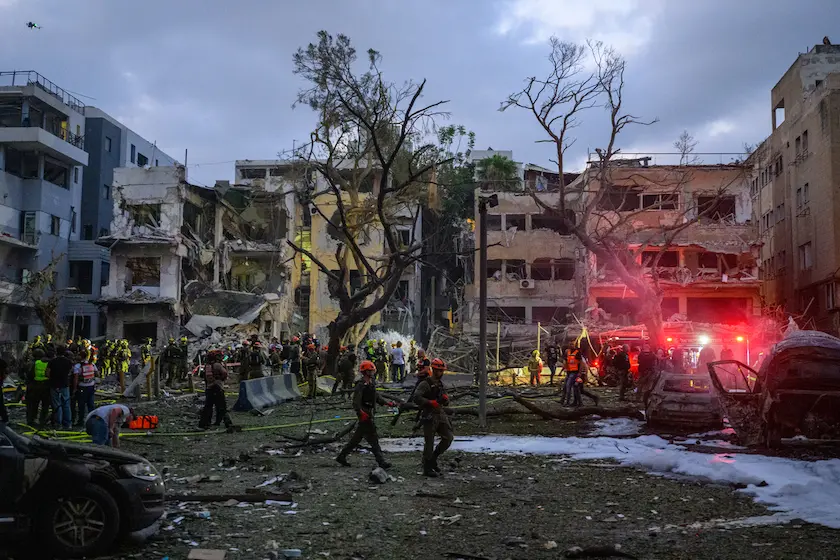
Thousands of Indian migrant workers in Israel face daily missile threats amid escalating conflict.
Sirens and Shelters: A New Normal for Indian Migrants
In the heart of Israel’s conflict zones, thousands of Indian migrant workers are navigating a grim reality, dodging missile strikes, living in fortified shelters, and working under the constant threat of war. Originally recruited to fill labour shortages in construction and caregiving after the October 2023 Hamas attacks, these workers now find themselves in the line of fire as tensions between Israel and Iran escalate.
The situation intensified after Iran’s June 13 missile barrage, prompting the Indian government to launch Operation Sindhu, a large-scale evacuation mission. Over 4,400 Indian nationals have been flown back from Israel and Iran via 19 special flights. Yet, many workers especially those in construction, have chosen to stay, citing economic necessity and a sense of duty to their employers.
For men like Surendra Singh Saini, a driller from Rajasthan, the decision is clear: “There are no jobs in India. If we return, we’ll regret it.” Earning between ₹1.5 to ₹2.5 lakh per month, many workers say the risk is worth the reward.
Their daily lives are punctuated by sirens and alerts, prompting them to rush into “miklat” reinforced bomb shelters. Some shelters are basic concrete bunkers; others, especially in Tel Aviv, are massive underground facilities equipped with air conditioning and toilets. Despite the chaos, workers have adapted to this new rhythm of life, often describing missile interceptions as sounding like “patakaas” (firecrackers).
Between Paychecks and Peril: Why Many Choose to Stay
The decision to remain in Israel is not made lightly. For many, it’s a calculated gamble. With unemployment and underemployment rampant in India especially among youth, Israel offers a rare chance at financial stability. Workers like Subhash Chand, a carpenter from Punjab, say they feel safer in Israel due to the country’s robust alert systems and shelter infrastructure than they would in uncertain job markets back home.
However, the risks are real. In March 2024, Patnibin Maxwell, a caregiver from Kerala, was killed in a Hezbollah missile strike near the Lebanon border. His death underscored the vulnerability of migrant workers stationed in volatile regions emptied of Israeli residents.
Critics argue that India’s decision to send workers into a conflict zone reflects a troubling prioritization of remittances over human safety. Labor rights organizations have raised concerns about poor housing conditions, lack of legal protections, and limited access to healthcare for these workers.
Despite these challenges, many migrants remain undeterred. Some even describe a sense of camaraderie and respect from Israeli employers. Supervisors like Dharma Kachawa, who manages over 400 Indian workers, have taken it upon themselves to ensure safety protocols are followed, often using WhatsApp groups to share alerts and updates.
Operation Sindhu and the Global Ethics of Labor Migration
Launched on June 18, Operation Sindhu has become a symbol of India’s commitment to its diaspora. The mission prioritizes evacuating those with medical emergencies, women, children, and students. Indian embassies in Israel and Jordan have set up 24/7 control rooms, coordinating safe passage through the Sheikh Hussein Bridge into Jordan and onward to Amman Airport.
Yet, the operation also highlights the ethical complexities of labor migration. India’s bilateral agreement with Israel, signed before the October 2023 conflict, aimed to send over 40,000 workers to fill gaps left by Palestinian laborers. While the agreement promised strict labor protections, the reality on the ground has been far more precarious.
Human rights advocates argue that migrant workers are being used as “economic shock absorbers”, filling dangerous roles in agriculture and construction while Israeli citizens evacuate. The death of Maxwell and injuries to other foreign workers have sparked calls for greater accountability and oversight.
As the conflict continues, the Indian government faces mounting pressure to reassess its labor export policies. Meanwhile, for the workers still in Israel, each day is a tightrope walk between hope and hazard.
Stay updated with the latest news on Rapido Updates. Keep yourself updated with The World, India News, Entertainment, Market, Automobile, Gadgets, Sports, and many more